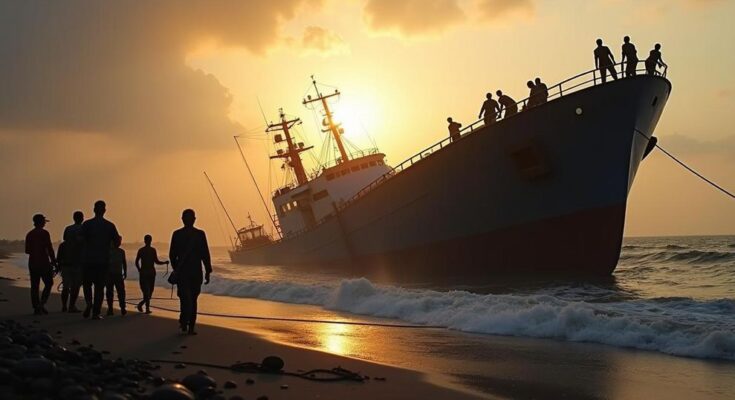Fourteen individuals have died and approximately 150 remain missing after a boat capsized in Niger State, Nigeria, due to overloading. Rescue efforts are ongoing, and local authorities emphasize the need for stricter enforcement of safety regulations amid concerns of governmental negligence and the impacts of climate change.
Tragedy struck in central Niger State, Nigeria, as 14 individuals have been confirmed dead and approximately 150 are missing following the capsizing of an overloaded boat late Tuesday. According to the Nigeria Emergency Management Agency, rescue operations are actively underway along the River Niger, where the incident occurred. The ill-fated vessel was transporting around 300 passengers returning from a religious celebration in the Mundi community to the Gbajibo village when it overturned due to excessive weight. Officials reported that about 150 passengers have been rescued, though many remain unaccounted for. Zainab Sulaiman, the Niger State emergency coordinator, stated, “Right now, there are 14 corpses that have been recovered, and the local divers are still in the water right now… The boat was overloaded, which is what has been happening. They overload the boats, and, you know, most of these boats are old. So, with the weight of people, sometimes they even carry foodstuff in bags, you see that the boat capsizes or breaks into two.” Boat accidents are prevalent in Nigeria, largely attributed to the poor enforcement of safety regulations, including load limits and the provision of life jackets. Local residents frequently disregard warnings against traveling late at night by water. This tragic incident has shone a spotlight on governmental negligence regarding transportation safety. A local official, who chose to remain anonymous, remarked, “As far as I’m concerned, there’s no one using life jackets in Niger State. You know, these are rural areas; they don’t even know what life jackets is all about. So, there’s nobody sensitizing them on the use of life jackets. The state government ought to have procured all these, but there’s none.” Sulaiman emphasized the need for stricter enforcement of regulations, stating, “The regulatory authorities should start to enforce these laws. If they need to send officers there at the boarding point, it will go a long way.” The impact of climate change also exacerbates these issues, with rising water levels attributed to increased rainfall and flooding. Last week, Nigeria’s hydrological agency cautioned about flooding risks due to the release of water from the Lagdo Dam in Cameroon. This incident is particularly concerning in light of previous tragedies, such as the recent drowning of over 60 farmers due to another boat accident in Zamfara State.
The phenomenon of boat capsizing in Nigeria is frequently linked to several factors including overloading, deteriorating vessels, and a lack of adherence to safety regulations. The enforcement of safety measures and public awareness regarding the utilization of life jackets is critical in curbing the high incidence of such maritime accidents. The rural areas of Nigeria often lack the infrastructure and resources to promote safety awareness effectively. Additionally, the implications of climate change, which results in unpredictable weather patterns and rising water levels, further complicate navigational safety.
The recent capsizing incident in Niger State highlights the urgent need for enhanced safety measures in Nigeria’s waterways. Overloading continues to pose a significant risk, compounded by governmental negligence regarding safety compliance. As rescue operations persist, the focus must shift to implementing stricter regulations and raising awareness about essential safety practices to prevent similar tragedies in the future.
Original Source: www.voanews.com




